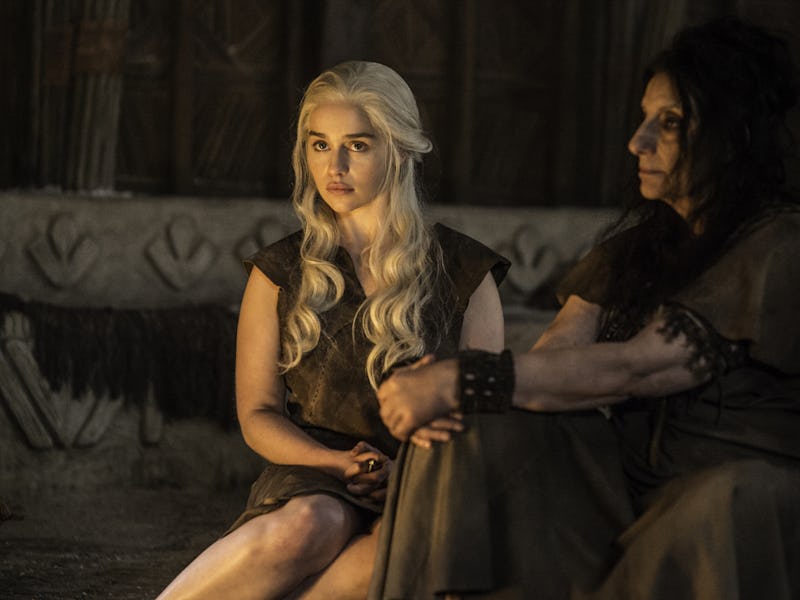Why Daenerys's Fire Scene Was A Misstep for 'Game of Thrones'
If 'Game of Thrones' intends to salvage Daenerys's character arc, this was not the way to do it.

Daenerys’s fire scene at the end of the latest Game of Thrones episode has the internet abuzz with discussions of her nudity and how this counters the books, since George R.R. Martin has said she isn’t fireproof. But whether or not it’s true to Martin’s vision isn’t the main issue: The scene is a worrisome direction for the show because it indicates the writers have no intention of correcting course on Dany’s story.
As we have noted, Daenerys is the protagonist who has undergone the least amount of character development and change throughout these past five seasons. Every season is a rinse and repeat: She obtains an army, claims a city, and asserts her will as her underlings look on in awe. Then she rules incompetently, breezes out, leaving the city worse off than it was before. Give or take a few dragons, it’s been the exact same song and dance every season, and it’s gone nowhere.
In the “Inside the Episode” clip for “Book of The Stranger,” showrunner David Benioff states his intention to have Daenerys’s story run as a parallel to Jon’s through their dual rebirths. He also makes an amusingly random Abe Lincoln reference, and it’s worth watching for that alone.
But the problem with having Dany run parallel to Jon is that Jon has only been reborn once. Understandably, then, it’s had a profound effect on his personality — he’s reached new levels of brooding and given into anger and existential despair. He murdered a child, for fuck’s sake. Sure, we thought Olly was the worst, but Jon treated him like a younger brother in the past.
He’s so apathetic and shaken to the core, Sansa even had to push him into agreeing to take back the North and save Rickon. Old Jon would have needed no convincing. Character development! Isn’t it grand?
Daenerys wouldn’t know, because even if she weren’t the flattest character, “rebirth” can’t affect her profoundly because it’s this is old business for her. To treat the two storylines as the same, then, is a narrative misfire.
There has always been a disconnect between the way the writers see her — apparently, they find her endlessly fascinating — and the way a large portion of the audience sees her. For a show with nuanced female characters, she’s shockingly a one-note. The fire scene is most disappointing of all, because it’s clearly supposed to be an epic moment. And yet, as it’s the exact same thing that happened in Season 1, all we can think is, “so we’re back where we started? All this bullshit her plot line has done for the past five seasons that has nothing to do with the main narrative is moot?”
Pretty much. Now, to give the writers the benefit of the doubt, as we haven’t seen what comes past “Book of the Stranger,” perhaps this is the beginning of Dany’s descent into madness and she’ll now go on a burning spree just like her father.
That would be an intriguing development. But unless that happens, Game of Thrones stands as the fantasy show that subverts fantasy tropes — except when it comes to Daenerys, the ultimate Mary Sue.
This scene no doubt fanned the flames for the portion of Game of Thrones fans who love their Khaleesi. But for the equally large portion who are exasperated with her circular wanderings and her state as the most hollow of Strong Female Characters, the scene made it abundantly clear that six seasons in, her entire character arc is all sound and fire, signifying nothing.